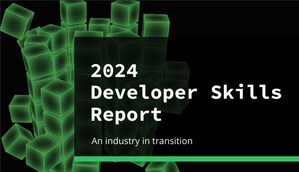HackerRank Survey of More than 39,000 Developers Finds Technical Hiring Managers Struggle To Assess Skill
81 percent of recruiters still rely on the resume, while nearly half of developers believe resumes are not a good reflection of their abilities
PALO ALTO, Calif., Jan. 23, 2018 /PRNewswire/ -- Programming is one of the fastest growing professions today, according to the U.S. Bureau of Labor Statistics. By 2020, there will be 1.4 million computer-science related jobs available with only 400,000 computer science graduates to fill those roles. As a result, software developers can be selective about where they work — fueling bidding wars and a perceived talent shortage — and companies need to figure out new ways to attract the talent they need.
HackerRank, a platform that helps companies evaluate technical talent based on skill, today released its annual 2018 Developer Skills Report, which surveyed more than 39,000 software developers around the world to get a pulse on the state of developer skills, including: what they're learning, what they care about, and how to best assess their abilities.
The findings provide a roadmap for companies and hiring managers to improve the way they hire developers, and reveal the biggest hurdles companies face when growing their developer teams. While 81 percent of hiring managers primarily rely on resumes to evaluate developers at the first stage of the recruiting process, nearly all report that measuring actual skill is the hardest part of the technical hiring funnel, above talent shortage and time-consuming interviews. Meanwhile, about half of developers say that resumes are not a good reflection of their abilities.
"2018 will mark the end of the resume for evaluating developers. As more and more companies across all industries are hiring software engineers, it's more important than ever to truly take the time to understand who developers are, what they're interested in, what drives them, and what they look for in a job. Without this, hiring managers will continue struggling to find the best technical people," said Vivek Ravisankar, co-founder & CEO of HackerRank. "With this report, we're helping companies become more developer-focused. Very few companies are doing tech hiring well because there's a lack of knowledge about what makes engineers tick."
The 2018 Developer Skills Report provides insights into the programming languages and frameworks developers are learning, love and dislike, the emerging technologies they're most interested in building, how they're learning, and what attracts them most to a job. Key findings include:
Developers are overwhelmingly self-taught. The ability to self-teach – not just a college degree – is the best path to becoming a skilled software developer. While 67 percent of developers have a computer science degree, roughly 74 percent say they are at least partially self-taught. In fact, one in four learned to code before they could drive.
Developers are constantly learning new skills, even after graduating. On average, developers know four programming languages and want to learn four more. Python is universally the most popular language and Node.js is the most loved framework. There is, however, a generational divide around newer languages and frameworks. While millennials generally like JavaScript and dislike Go, the opposite is true among 45-54 year olds. What's more, younger developers prefer newer frameworks like AngularJS and React, while older developers prefer Vue.js.
YouTube is more popular than books for learning. The very nature by which developers learn is evolving, and can't be quantified by a resume. 88 percent of developers report that they head to Stack Overflow when they need to learn a new skill or tool. As a second source of knowledge, millennials head to YouTube (69 percent), while Gen Xers prefer books (71 percent).
What developer candidates value in a job defies current norms. In the hopes of attracting top talent, Silicon Valley companies have leaned in to perks and stock options. However, when asked what they care most about in a job, developers rank these as the least important priorities. Rather, work life balance (57 percent), professional growth and learning opportunities (55 percent) and compensation (45 percent) are the true deal breakers. Companies looking to build a developer-first brand should keep these values in mind.
The full report detailing these and other findings is available here.
About HackerRank
HackerRank is a technical hiring platform that helps businesses evaluate software developers based on skill. Over 1,000 customers across all industries, including 5 out of the top 8 financial institutions in the U.S., rely on HackerRank's automated skills assessments to evaluate and hire technical talent from around the world. More than 3.2 million developers (16 percent of the global developer population) trust HackerRank to learn and practice coding. On average, HackerRank powers over 200,000 coding challenges per month in over 35 programming languages. In fact, every 15 seconds a candidate takes a new assessment worldwide. For more information, visit www.hackerrank.com.
Media Contact
Katie Sullivan
Bateman Group
[email protected]
SOURCE HackerRank
Related Links
WANT YOUR COMPANY'S NEWS FEATURED ON PRNEWSWIRE.COM?
Newsrooms &
Influencers
Digital Media
Outlets
Journalists
Opted In




Share this article